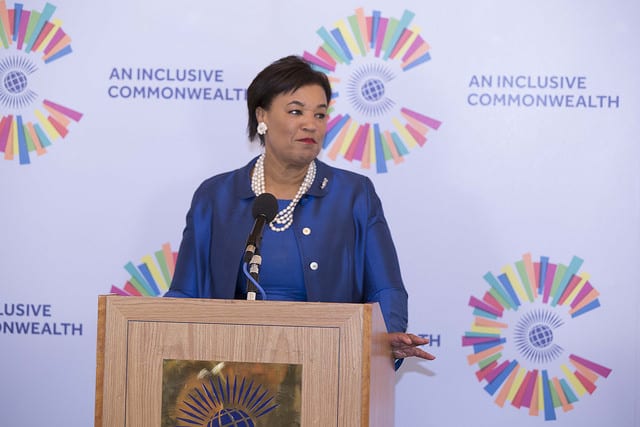As Guyana gears up to become a major oil producer in the region the South American country’s commitment to a green economy can be maintained by pursuing a ‘regenerative model’ of development according to Secretary General of the Commonwealth Secretariat, Baroness Patricia Scotland.
Baroness Scotland was at the time addressing the media at a briefing on Friday at the National Communications Network’s (NCN) Studio, in Guyana’s capital, Georgetown following the close of a Regional Workshop for Judicial Officers and Prosecutors organized by the Commonwealth Secretariat and the Caribbean Financial Action Task Force (CFATF).
She told media operatives that, “One of the good things is that the Secretariat has been working with Guyana for a number of years to help develop the opportunities…as a result of the huge discovery of oil and gas and I know that Guyana has made a commitment to become one of the greenest countries in the world and the commitment to climate change and doing that which delivers on the Paris agenda has absolutely been there.”
Baroness Scotland, however, advised that while the country tries to harness the full potential of the sector, it must be done in a way that is not detrimental to the environment.
She added, “We do have an opportunity to work together on this regenerative model of development to try and take advantage of the oil and gas sector but in a very sustainable way not to do violence to our land to our oceans but to be responsive and responsible.”
The Commonwealth Secretary General says, while she is aware that for a developing country, like Guyana, the oil and gas sector would pose some challenges, she is equally pleased that, “The Government in Guyana has made it clear that they wish to do that (manage the sector) in a way that would be helpful (to the environment).”
Guyana’s President David Granger had indicated at an event in New York late last year that, “We will become a ‘green’ state and we will use the petroleum profits to develop the infrastructure, and develop the other requirements of our country. Petroleum is going to be transformative from an economic point of view [but] we are not going to destroy our biodiversity, our beautiful rivers and waterfalls, our lakes. We’re going to ensure that new industries fit into our landscape, fit into the plan for the economic development of our country.”
This is aligned with the Green State Development Strategy, which is a document prepared by the Ministry of the Presidency with the technical and financial support of UN Environment, in close coordination with the UN Country Team, to guide this country’s economic and socio-cultural development over the next 15 years.
It will also lay the foundation for inclusive green economic and social growth, provide a roadmap for achieving sustainable development goals and related targets, and outline a long term vision for a prosperous and equitable future.
President Granger had also explained that, “The ‘green state’ will demonstrate how our extractive industries – bauxite, diamond and gold mining and logging – can be aligned with the protection of our environment, the preservation of our biodiversity and the promotion of the generation of energy from renewable sources. The ‘green state’ will become a model of environmental stewardship.”
Dominican-born Baroness Scotland, who was the Attorney General under Gordon Brown, has become the first British citizen to be elected Secretary‑General of the Commonwealth in its 66-year history and also the first woman to hold the post.





Very good information. Please remember to look after the elderly. They are entitied to the gains too. Free rides on public transportation and a decent pension. NOT FORGETTING INFLATION. GET RID OF IT. IT IS KILLING THE GUYANESE CITIZENS.